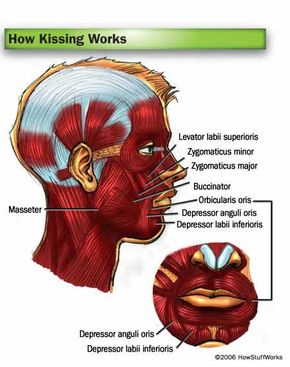The Anatomy of a Kiss
Most people think about what to do when kissing another person, but fewer ponder all the technical details behind it. No matter who you're kissing or why, the basic kiss relies heavily on one muscle - the orbicularis oris, which runs around the outside of your mouth. Your orbicularis oris changes the shape of your mouth while you talk, and it puckers your lips when you kiss.
But orbicularis oris is really just the tip of the iceberg. About two-thirds of people tip their heads to the right while kissing. Scientists believe this preference starts before we're born, when we tip our heads to the right in the womb. So muscles in your head, neck and shoulders tilt your head so your nose doesn't collide with your partner's nose.
Advertisement
In addition, the rest of the muscles in your face and head also play a part in a more involved kiss. For example:
- Several muscles move your lips around. Zygomaticus major, zygomaticus minor and levator labii superioris pull your upper lip and the corners of your mouth upward. Depressor labii inferioris and depressor anguli oris pull the corners of your mouth and your lower lip downward.
- If you open your mouth, your lateral pterygoid pulls your jawbone down. Your massiter, temporalis and medial pterygoid close your mouth.
- Several muscles - your genioglossus, styloglossus, palatoglossus and hyoglossus - move your tongue if you decide to use it.
Anyone who has ever been kissed knows that the sensations involved aren't confined to the mouth. Your facial nerve carries impulses between your brain and the muscles and skin in your face and tongue. While you kiss, it carries messages from your lips, tongue and face to your brain to tell it what's going on. Your brain responds by ordering your body to produce:
- Oxytocin, which helps people develop feelings of attachment, devotion and affection for one another
- Dopamine, which plays a role in the brain's processing of emotions, pleasure and pain
- Serotonin, which affects a person's mood and feelings
- Adrenaline, which increases heart rate and plays a role in your body's fight-or-flight response
When you kiss, these hormones and neurotransmitters rush through your body. Along with natural endorphins, they produce the euphoria most people feel during a good kiss. In addition, your heart rate increases and your blood vessels dilate, so your whole body receives more oxygen than it does when you're just standing around. You can also smell the person you're kissing, and researchers have demonstrated a connection between smells and emotions.
